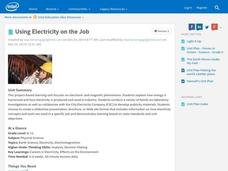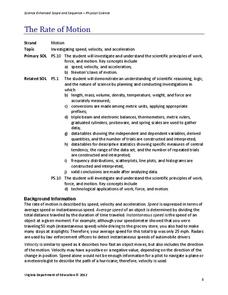EnLiST
Trap Your Own Insects: What’s in Your Backyard?
Young entomologists construct three types of insect traps—pitfall, pollinator, and panel—before setting their traps out and observing what they caught. They then observe what types of insects the different traps attract.
Alabama Department of Archives and History
Alabama Farm Life in the Great Depression
The Great Depression not only impacted city folk and factory workers, it also had a profound effect on farmers. Young historians examine primary source materials that document the struggles of Alabama farmers during this time and...
Federal Reserve Bank
Important Financial Documents
Emergencies usually come by surprise — preparation is key. Help to reduce anxiety of the unknown by having a financial plan in place for when they arise. Important documents are gathered and action plans are documented.
Federal Reserve Bank
Purchasing a Vehicle
Start your engines! Prevent negative car buying experiences by arming pupils with information. Prepare your young drivers to make informed decisions when they are ready to purchase a car. All aspects are considered from the type of car...
Teach Engineering
Spool Racer Design and Competition
Wind it up and let it go. Individuals build a basic spool racer in the second portion of a six-part unit on energy. After receiving three criteria, pupils modify their designs to meet the new challenge. Pairs compete against each other...
Science 4 Inquiry
The Impact of the Sun and Moon on Tides
In 150 BC, Seleucus of Seleucia theorized that the moon causes the tides. Scholars learn about what causes tides by studying the interactions of gravity between the sun, moon, and Earth. They use technology to formalize otherwise...
Federal Reserve Bank
Cash Flow and Balance Sheets
What is your car worth? How much do you owe? Individuals create their personal cash flow and balance sheets. They learn the difference between an asset and liability using their personal information to complete the activity.
Federal Reserve Bank
Income Taxes
Most adults dread April 15 — tax day! Tax preparation can be intimidating even for adults. Build confidence by leading individuals through the process and then give them a scenario to practice. The exercise uses tax vocabulary to give...
Federal Reserve Bank
Creating a Budget
Learning to create and maintain a budget is an important life skill. Guide individuals in the discovery of their spending habits and how to track them. They then use what they learned to create a budget and make decisions on where they...
Federal Reserve Bank
Your Credit Report
What is your credit score? How do you find it? Help your pupils answer these questions and more. They will access their free credit report and then analyze its meaning.
Federal Reserve Bank
Saving and Investing for the Long Term
Create savvy investors with an activity that uses an online resource to allow individuals to invest in the stock market. The teacher is able to track activity and progress. Stock tips and strategies are shared.
Intel
Using Electricity on the Job
Learners explore electricity, discussing its importance and researching different ways in which electricity can be generated. Groups present their findings to the class and then create publicity materials which promote and educate about...
Media Education Lab
Propaganda Techniques
In an age of fake news, alternative facts, and biased reporting, it is more important than ever that 21st century learners develop the critical-thinking skills necessary to recognize, analyze and resist the propaganda techniques used in...
Anti-Defamation League
Student Dress Codes: What's Fair?
The controversy over school dress codes continues. The debate involves questions like, why is there a policy? Who sets the policy? Who enforces the policy? What is a fair policy? Tweens and teens have an opportunity to engage in the...
University of Wisconsin
Rain Garden Species Selection
The activity really comes to life within its intended unit on starting a rain garden. Working in groups, participants research native plants and coordinate them with the conditions in the designated garden area. Give the class access to...
World Wildlife Fund
Graphs and Charts
A two-part worksheet incorporating bar graphs and pie charts, young mathematicians can practice their graphing skills. Pupils answer questions using graphs and charts but are also challenged to create their own using a given set of data.
National Museum of Nuclear Science & History
Alphas, Betas and Gammas Oh, My!
Referring to the periodic table of elements, nuclear physics learners determine the resulting elements of alpha and beta decay. Answers are given in atomic notation, showing the atomic symbol, mass, atomic number, and emission particles....
Teacher Created Resources
The First Thanksgiving Book
Looking for a Thanksgiving week activity? Try this seven-page printable book documenting the story of the first Thanksgiving. Each page (1/2 sheet) has a short text along with a picture kids can color in.
Math Solutions
Dr. Seuss Comes to Middle School Math Class
If you think Dr. Seuss has no place in a math classroom, then take a look at this resource. Based on the classic children's book Green Eggs and Ham, this sequence of activities engages children learning to model real-world contexts...
Center for Civic Education
Becoming a Voter
What are the requirements to register to vote in the United States? Young citizens evaluate this process by working with handouts, informational texts, discussion, and research, as well as complete a sample voter registration form.
K12 Reader
What Do You See? (Inferences)
Making inferences is a skill that goes beyond the comprehension of written text. In this simple exercise, young learners are provided with a photograph and asked to answer a series of inference questions using only on the...
Edmond Public Schools
8th Grade Science Resource Book: Unit 2 - Physics
Get things moving with this extensive collection of physical science resources. Covering the fundamentals of measurement, graphing, lab safety, and experimental design as well as the specific scientific concepts...
K5 Learning
Saving the Birds
Learn about the kindness and strength of Abraham Lincoln with a reading comprehension activity. After third and fourth graders read a short story about Lincoln saving a family of robins, they answer four questions about the plot and...
Virginia Department of Education
The Rate of Motion
How much time does it take to jump over three balloons? Pupils calculate the speed of tasks that require different motions. They determine motions for tasks such as walking, skipping, hopping, and jumping before creating a...
Other popular searches
- Spring Art Lessons Primary
- Spring Lessons Kindergarten
- Science Spring Lessons
- Esl Lessons Science Spring
- Multicultural Spring Lessons
- Art Lessons Spring
- Art Spring Time Lessons

























